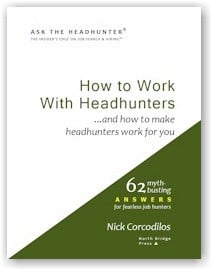By Joe Borer, Headhunter
 Headhunters earn their living by finding and evaluating job candidates for the benefit of their clients. Some are better at this than others, and you should know what distinguishes a good headhunter from a not-so-good one — at least from the standpoint of the job hunter. This will help you avoid (a) wasting your time, (b) divulging confidential information to the wrong people, and (c) developing false hopes.
Headhunters earn their living by finding and evaluating job candidates for the benefit of their clients. Some are better at this than others, and you should know what distinguishes a good headhunter from a not-so-good one — at least from the standpoint of the job hunter. This will help you avoid (a) wasting your time, (b) divulging confidential information to the wrong people, and (c) developing false hopes.
There are a lot of headhunters out there, and they tend to come in two types:
- Headhunters who get into the business because the cost of entry is low. They’re looking for a quick buck. They’re in a big rush to close deals, and they aren’t very concerned about what anyone thinks about how they’re doing it. That’s not to say they’re all dishonest, just that they aren’t taking the long view. You’ll get pretty frustrated working with them because of the way they treat their clients, their professional community, and their job candidates. (See Recruiters: Raise your standards or get out.)
- Headhunters who are building a business based on reputation, relationships and trust — and on making a contribution to their professional community. They’re in less of a rush, are more willing to take time to establish long-term relationships, and they seek to establish their credibility as much as to earn a buck. This doesn’t mean they’ll take anyone’s call, just that they’ll act responsibly.
How does a job hunter separate a knowledgeable, trustworthy, conscientious, effective headhunter from the rest? Assess him (or her) on these four attributes:
Knowledge
A good headhunter will have loads of valuable information about the company he or she is representing, about the job, the manager and the team, about why the job is open, and about the technology (if applicable). He’ll be able to tell you about the interview itself: how the manager evaluates candidates, how the team will be involved and how the selection process will play out. Most important, the headhunter will be able to coach you in a way that will maximize your chances of winning an offer.
Even good headhunters don’t have all the answers. But the good ones will tell you when they don’t know something.
Tip: Ask the headhunter thoughtful questions about the position he or she called you about. Don’t just focus on the title and salary — get into the work itself.
A good headhunter will share lots of his knowledge and in doing so give you enough information to help you make a decision about whether you want to pursue the job (or recommend someone else). A not-so-good headhunter will quote you the title and the salary, but will be in a rush to get off the phone so he can call the next person on his list. (See Good Headhunters: They search for living resumes.)
Integrity
A trustworthy headhunter is proud of his business and glad to talk about it. Her success depends on you trusting her.
Tip: Ask thoughtful questions about the headhunter and her work:
- How many years has she been in the business?
- What areas does she specialize in?
- Who are her client companies?
- What specific positions does she usually recruit for?
The answers matter, of course, but what you’re really looking for is an indication that the headhunter is forthright and willing to tell you about herself. A headhunter who’s in the business for a quick buck won’t have much of a story to tell because she’s operating on the fringes, picking up fees wherever she can. A good headhunter will demonstrate that she has good clients who respect her, and that she knows the ins and outs of the industry she recruits in.
A good headhunter also reveals her trustworthiness by keeping her promises.
Tip: Don’t let a headhunter slide on this point — you’ll wind up wasting your time in the long run.
- Does the headhunter call when she promises to call?
If she says she’ll call you early next week that means Monday or Tuesday of next week — not Friday at 6:00pm or two weeks later. - Does she return your calls?
Once you’ve established a relationship, a good headhunter always returns your calls, just as you should return hers. However, if you made the first contact and the headhunter didn’t show any real interest, don’t expect she’ll talk to you again in the near future. She’s not being rude, but she’s also not in business to help you manage your career. Either way, you should expect the headhunter to honor her commitments and to treat you considerately.
Conscientiousness
A good headhunter tries to locate and identify the best qualified talent for his client company. That’s why he won’t take cold calls or waste time with people who want a “job handout.” His focus is on the companies and people who will help him do his job. When he’s working on a search that has led him to you, he will be 100% attentive to you.
Tip: A good headhunter won’t just ask for your resume. He’ll do his research by taking the time to ask you the tough, detailed questions that will reveal whether you fit the company, the manager, the job and the technology. (Some headhunters will have a researcher on their staff handle this preliminary discussion. Expect the researcher to be as professional as the headhunter, and insist on talking to the headhunter himself if the discussion seems to indicate you’re a potential candidate.)
To a good headhunter, your resume is a follow-up, a kind of background material. Getting your resume isn’t his objective when he calls. If a headhunter just asks for your resume and says, “I’ll get back to you,” you know you’re dealing with a guy who’s too busy dialing for dollars and not taking the time to do a great job for his client.
By investing the time to get to know you, a headhunter demonstrates his conscientiousness. So, pay attention to the questions the headhunter asks you: He’s revealing himself as much as he’s probing you.
 Want to learn the ins and outs of working with headhunters?
Want to learn the ins and outs of working with headhunters?
Nick’s acclaimed 130-page PDF book covers it all! Learn how to:
- Recognize the good headhunters
- Dismiss the unsavory ones
- Negotiate with a headhunter
- Get the right headhunter’s attention
- Includes 5-page crib sheet
Check out the book:
How to Work With Headhunters…and how to make headhunters work for you.
“I just downloaded How to Work with Headhunters. Excellent! I will recommend that each of our Executive MBAs get this book. It’s a very comprehensive treatment of every aspect of recruiting, search firms, career management firms and more. I especially like the Back of the Napkin section at the end. Looks like you thought of everything!
Susan Dearing
Director, ProMBA Career Management Center
EMBA Career Coach
UCLA Anderson School of Management
Effectiveness
A good headhunter finds the right candidate and fills the job. That’s her business. To accomplish this, she has to gain the respect of the people she is recruiting, and she must demonstrate an ability to be right. If she repeatedly makes wrong placements, her reputation is shot.
When people get frustrated because a headhunter won’t talk to them, it’s often because the headhunter is very good at what he does. And talking to just anyone isn’t his job. A good headhunter usually does not have the time to spend with individuals who contact him unless they happen to have expertise in the exact assignment he’s currently working on. (I’ve gotten such “lucky” calls only twice in eleven years.) My own specialty is the semiconductor industry, which means I cannot help the vast majority of the people who find me in a directory.
What does all this mean to you?
Tip: If you are actively looking for a job, then take control of your own job search, because the good headhunters won’t talk to you. That seems contradictory, but it makes perfect sense when you consider what we’ve said about the headhunter’s business: She can’t be an effective headhunter if she starts acting like a career counselor. If you’re the person the headhunter is looking for, she prefers to find you herself. Believe it or not, this is one of the best ways to recognize a good headhunter: She’s the one who calls you.
But to judge them properly, evaluate headhunters carefully on all four of the attributes described above. When you encounter a good headhunter, do your best to help them with their search. Because there’s one last attribute you should know about: A good headhunter remembers.
The author of this article, Joe Borer, is a San Diego-based headhunter who specializes in the semiconductor industry.
: :
